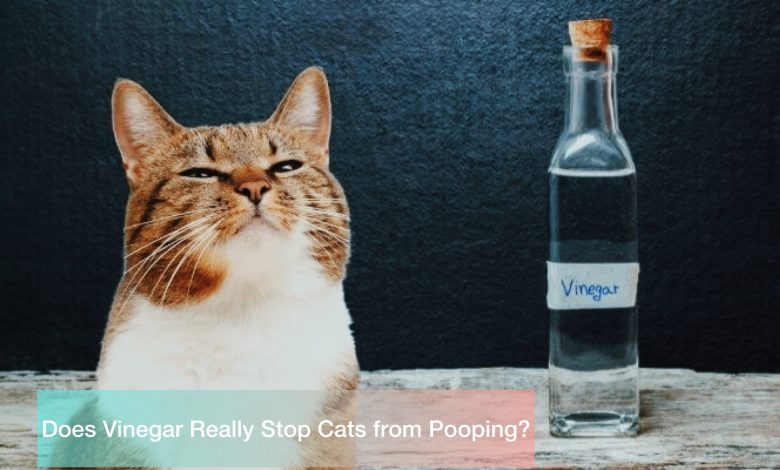Does Vinegar Really Stop Cats from Pooping?

Hey there, fellow cat owners! If you’re like me, you’re always on the lookout for ways to manage your furry friend’s behaviors, including their bathroom habits. You may have heard that vinegar can deter cats from pooping in certain areas, but is there any truth to this claim? In this article, we’ll know if Vinegar can Stop Cats from Pooping?
belief and dive into the fascinating world of cats’ sensitivity to smells. SULLPET
Understanding Our Feline Friends’ Sensitivity to Smells:

First things first, let’s talk about just how sensitive cats’ noses are. Cats have an incredible sense of smell that is estimated to be 14 times stronger than humans! Their keen sense of smell allows them to detect odors that we might not even notice.
They use their sense of smell to navigate their environment, find food, mark their territory, and communicate with other cats. Just like how we have our own unique preferences when it comes to smells, our cats do too!
The Scoop on Vinegar:
Now, let’s talk about vinegar. Vinegar is a common household item that many of us use for various purposes, like cleaning, cooking, and even as a natural remedy for certain ailments. It’s made up of acetic acid, water, and other components, and it has a distinct odor that can be described as sharp or pungent. We’ve all smelled vinegar before, and it’s no secret that it has a strong scent that can linger in the air.
Does Vinegar Stop Cats from Pooping?
So, here’s the big question: does vinegar really stop cats from pooping? Well, there’s no scientific evidence to support this claim. Cats have their own unique preferences when it comes to smells, and what may be unpleasant to one cat may not bother another.
While cats may avoid areas with a strong vinegar smell, it’s not a guaranteed method to prevent them from pooping there. After all, cats consider various factors when choosing where to do their business, like the location, substrate, and accessibility of the litter box.
Also, Read: Can Cats Enjoy Sausage?
Cats and Vinegar: Potential Effects and Risks
It’s important to note that cats can be sensitive to strong odors, including vinegar. Exposure to strong smells like vinegar can potentially cause discomfort or stress for our feline friends. Cats may avoid areas with a strong vinegar smell, but it’s not a foolproof solution for managing their bathroom habits.
In fact, direct contact or ingestion of vinegar can be harmful to cats, causing irritation or digestive issues. It’s crucial to be cautious and avoid using vinegar or any other strong-smelling substances directly on or around cats without consulting with a veterinarian.
Exploring Cat-Friendly Alternatives:
If you’re looking for ways to manage your cat’s bathroom habits or deter them from certain areas, there are other more effective and cat-friendly methods to consider. For instance, providing multiple clean litter boxes in suitable locations, using your cat’s preferred litter types, and ensuring regular cleaning of litter boxes can go a long way.
Creating a stimulating and enriched environment for your cat, along with seeking guidance from a veterinarian or a professional cat behaviorist, can also provide valuable insights and recommendations tailored to your cat’s individual needs.
Also Read: How to Tell If Your Cat Still Has Kittens Inside
Wrap-Up: Does Vinegar Stop Cats from Pooping?
In conclusion, while there may be a belief that vinegar can stop cats from pooping in certain areas, there’s no solid scientific evidence to back up this claim. Cats have their unique preferences when it comes to smells, and exposure to strong odors like vinegar can potentially cause discomfort or stress for our feline friends.
It’s important to remember that cats are individuals with their own unique personalities and behaviors, and what works for one cat may not work for another.
When it comes to managing your cat’s bathroom habits, it’s best to focus on creating a conducive litter box environment and understanding your cat’s preferences. Providing clean litter boxes in suitable locations, using your cat’s preferred litter types, and regular cleaning can go a long way in promoting proper litter box use.
It’s also important to ensure that your cat has access to a stress-free and enriched environment, as stress can often be a factor in inappropriate elimination behaviors.
If you’re struggling with managing your cat’s bathroom habits, it’s always a good idea to consult a veterinarian or a professional cat behaviorist. They can provide expert advice and guidance tailored to your cat’s individual needs and help you come up with a plan that’s safe and effective for both you and your feline friend.






One Comment